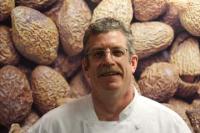July 5, 2012

After spending 11 years as a chef at Legal Seafoods, Tim Williams is starting anew at Community Servings, a non-profit food service based in Jamaica Plain. Williams, who was the regional executive chef for six Legal Seafood restaurants between Philadelphia and Washington D.C., decided to make a change when his wife’s job was transferred back to Boston.
Community Servings was founded in 1989 in Dorchester by a group of AIDS activists, faith groups and community organizers to provide home delivered meals to individuals living with HIV/AIDS. Now, according to David Waters, CEO of Community Servings, the non-profit serves about 1300 people per year across 250 square miles in Massachusetts, offering 25 different medically tailored diets. In the past year, 168 clients in Dorchester and 56 Mattapan clients were served by the non-profit. Community Servings serves people unable to cook or shop for themselves because of critical illnesses like HIV/AIDS, cancer, MS and Lou Gehrig’s disease as well as their family members and caregivers.
A former resident of Jamaica Plain, Williams’ passion for cooking comes from spending time in the kitchen with his mother when he was young. His father was a naval officer stationed in Asia where his mother would visit and bring back new recipes to try. Williams later spent five years in the army as a Food Service Specialist to receive his GI Bill and then moved onto the Culinary Institute of America to pursue a culinary degree.
Williams worked in several different restaurants and hotels around the world, including Perry Restaurant Group in Vermont, Riversong Lodge in Alaska and the Marco Polo Hotel Group in Russia and the Republic of Georgia before joining Legal Seafoods.
Williams said his area of expertise is seafood since he worked at another seafood restaurant right before joining Legal Seafoods. While at Legal, Williams helped the chef open nine new restaurants within the chain and managed the entire process of opening and training the kitchen team.
The decision to leave the corporation was huge for Williams, he said, since he would basically have to start all over with building new relationships and finding a place in the company. Williams still has a good relationship with Legal Seafoods, he said, since there were no hard feelings when he left the company.
“It took a lot of soul searching to make the decision, but I’m very happy that I made [it],” Williams said.
Williams began his job search on the alumni website job board of Culinary Institute of America, where he saw the listing for a position as executive chef in Jamaica Plains at Community Servings.
“I’d never really seen a job listing with that scope of a job that I’m qualified for at this point of my profession,” Williams said. “It popped right out so I started doing some investigating.”
As executive chef, Williams oversees all kitchen operations and works with volunteers and trainees in the job training program. Waters said he is very excited to have Williams as the executive chef as Williams’ professional background was exactly what Community Servings was looking for. It helped that the expectations in the Legal Seafoods kitchens were very similar to those of Community servings as far as cleanliness, safety and quality of food goes, Waters added.
For Waters, Williams brings the “perfect personality” to the job.
“He has a great sense of beautiful food and the rigor of running a professional kitchen,” Waters said. “We produce 2,000 meals a day out of our kitchen, and he’s got a great training for that. He’s also very excited about the mission – the opportunity to give back and serve people is what I think drew him to the job.”
Williams said the toughest part of his transition was going from a menu and food inventory that was so defined to one that was defined by the donations Community Servings receive from farms and other people. The main goal, he said, is preventing wastefulness by getting all the food processed and cooked quickly since the donations are sometimes overwhelming. Williams has a passion for incorporating freshness and brightness into the meals, and he said his job also demands organization as well as efficiency.
“You really have to just be on your game and think in the moment and … be creative on the spot,” Williams said. “There’s a learning curve to any job, but I’ve jumped right in with both feet and I’m really starting to enjoy it.”
“I get to see the best of humanity every day,” added Williams. “At this point in my career, it’s not about me, it’s everybody else. To find a mission as powerful as this one... it’s really the defining thing that makes me get up every day and look forward to doing this.”
Topics:


